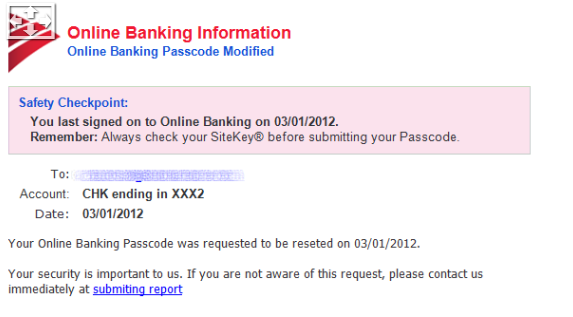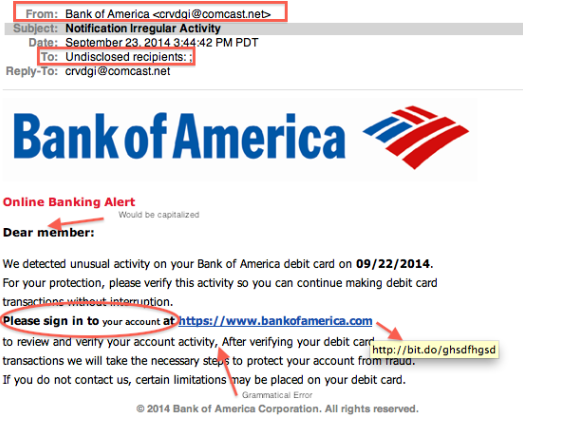What is Bank Of America Email Virus?
Bank Of America Email Virus refers to emails sent by scammers pretending to be from the Bank of America. These kinds of emails are aiming to phish people into revealing their banking information, which would result in stolen funds from bank accounts. Phishing emails are nothing new and have caused millions of dollars in damages, and people continue to fall for them. People are tricked into believing that the emails are real, click on provided links and end up giving their banking information to cyber criminals. It’s not difficult to spot phishing emails but unfortunately, many people are either not aware of the signs or do not pay enough attention to notice them.

What are the signs of a phishing email?
One of the first signs of a phishing email can be seen in the way you are addressed. If you are a customer of a bank, or any other company for that matter, you will always be addressed by name. Names are inserted automatically, so never will you be addressed Dear Customer, Member, Sir or User. Ever. If you are being addressed in that manner by a company or bank of whom you are a customer, that should immediately ring alarm bells.

Another glaring sign of a phishing email is grammar mistakes in the text. Some mistakes may be subtle, while some may be very obvious. It is an open secret that crooks purposely make a lot of grammar mistakes in phishing emails in order to filter out people. If a person does not pay attention to the mistakes, they are much more likely to be phished successfully. Legitimate company or bank emails will never contain mistakes as they are usually generic emails that have been checked carefully.
The sender’s email address can also be a clue about whether you are dealing with a phishing email. The address can look legitimate, but it’s always recommended to check whether it actually belongs to the company or bank that’s supposedly emailing you. It’s not difficult to make an address look legitimate, so always check before you engage. You can simply use a search engine to do that.
Finally, look for unusual statements that you wouldn’t normally find in a legitimate bank email. For example, one phishing Bank of America email states that they ask for private information (account numbers, PINs, social security numbers, etc.) via emails. In a legitimate bank email, the complete opposite of that would be written. Banks never ask for such personal information, and never will. Same goes for law enforcement agency or bank phone calls. So if you are asked for you banking information via strange phone calls or emails, you can be sure you are dealing with a scam.
What should you do with phishing emails?
When you realize that you are dealing with a phishing email, such as Bank Of America Email Virus, you should inform your bank. A simple search with a search engine will provide information about who you should forward the email to or who you should contact. And if you realize that you might have fallen victim, immediately contact your bank and change your online banking login credentials.